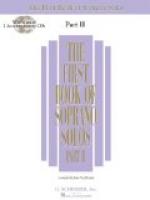“Winnie,” she said, “you know I always loved you. I love you better than ever now.”
Then they both cried, though they could not have explained to each other why. Adele was the first to recover herself.
“I am such a goose,” she said. “I always cry. But now, Winnie,” she added, “are you not going to keep on singing, only ’in spirit and in truth,’ as you say?”
“I hope I shall keep on singing,” said Winifred, slowly, “but I dare not trust myself, just now anyhow, to go on with the choir. I am so used to singing for applause”—and she blushed at the remembrance of such a motive in the house of the Lord—“or for music’s sake, I am afraid I should find myself doing so still. I mean to worship God truly,” and a look of determination settled the sensitive face into resolute lines; “and I shall try to do that which will help me most to that end. It seems to me now that that will be to join the others unobserved. Perhaps I shall see it differently some day, but now I feel it safer to put my poor, vain, little self as far out of sight as possible and try to think of God.”
“You are a dear, honest little thing!” cried Adele affectionately. Then she added very seriously, “but it almost seems to me that if your objections are right they might apply to the whole system.”
Winifred looked perplexed. She had dimly thought of that. The word “system” recalled Mr. Bond’s phrase, “an organized system of unreality,” which she had turned over in her mind a number of times. Would he call the choir that? She thought of the leader, who professed nothing as a Christian; of the organist, who, she must admit, was a drunkard; of George Frothingham with his careless indifference; and of herself of two days ago. Perhaps there were others—very likely there were—who sang with grace in their hearts unto the Lord, but it certainly looked as though that were no object in their selection. But she thought of Doctor Schoolman, who raised no objections and always sat with such an expression of bland repose while they sang. She thought of the elders—her own father among them—and, indeed, of common consent everywhere in all the churches; at least, all she knew. Who was she, who was only “just beginning to worship,” that she should entertain ideas contrary to them all?
“I don’t know,” she said hesitatingly to Adele, “I hope you will not think my ideas revolutionary. I can’t judge for others—others so much wiser than I. But, for myself, I think I see the way I ought to take.” And so she settled the matter for herself, on her own convictions.




